THE ASTROLOGICAL CHART OF ALEXANDER THE GREAT
(by Thomas Gazis)
Copyright: Thomas D. Gazis
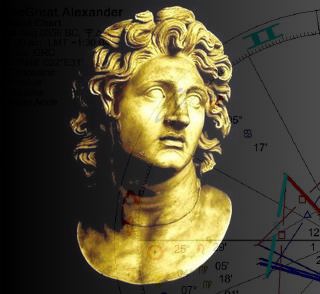
(by Thomas Gazis)
Copyright: Thomas D. Gazis

What is it that makes Alexander the Great such a unique figure in world history? Why out of so many legendary conquerors he apparently holds the most prestigious place? Well, there is a reason for this: the man accomplished a whole series of marvelous deeds, of the kind that no other human being has ever accomplished! At age 20 he became king of Macedonia1. Under his command, he led an army of 30.000 men to the ends of the then known world, into exotic and dangerous lands conquering every single one of them! Side by side with his soldiers and always on the front, he fought more than one hundred battles, winning almost all of them! He created an empire that was 40 times bigger than the one he inherited - actually he formed the greatest empire ever formed by a single individual! He was a much-educated conqueror, carrying in his mind the vision of a unique, homogenized and highly civilized empire. He died early though, not having completed the 33rd year of his life.
But apart his marvelous deeds, there is something more to Alexander: an unusual charisma seems to be emanating out of this semi-mythical figure, a charisma that we can still feel today, 2300 years after his death! Actually, there are so many heroic and - at the same time - tragic elements ("archetypes") enacted in Alexander’s saga that we inherently tend to transform this man into a mythical figure, into a sort of Achilles! But while Achilles is probably no more than a “cartoon” figure, Alexander, on the other hand, is a real person, a “flesh and blood” person just like us!
I think that in our collective unconscious Alexander has been transmuted into some kind of martyr, into a universal martyr of the human race! He was young, handsome, strong, charismatic and audacious, but still he was as much mortal as we are. Thus, he became a representative of our race that surpassed the threshold of human dimensions and almost reached divine domains, a man who dared to confront himself with the divine and perhaps for this reason perished.
The quest for Alexander's chart
For all of us dealing with astrology it would be obvious to ask whether the astrological chart of Alexander the Great has been preserved or not. Could there be, for example, any archaeological finds in Macedonia (there is a controversy over this name, please read note 1 at the footer of this article), in the fatherland of Alexander the Great, related to his horoscope? The fact is that neither in Macedonia nor in any other part of Greece astrological elements of that period have ever been found.
Personally, I have meticulously observed and examined hundreds and hundreds of ancient statues, urns, stelae, coins etc. of the classical period - while at the same time I have read or browsed the works of hundreds of classical philosophers, dramatists, comedians etc. - and in none of them have I encountered astrological symbols or even a single word explicitly involving astrology! Thus, I am convinced that till the end of the fourth century B.C.E. astrology was not rife in Classical Greece (although it was more so in Archaic Greece, as I have suggested in another article). This "astrology vacuum" is rather inexplicable, because Greece lies rather close to the Middle East and to Mesopotamia, to the very cradle of western astrology that is!
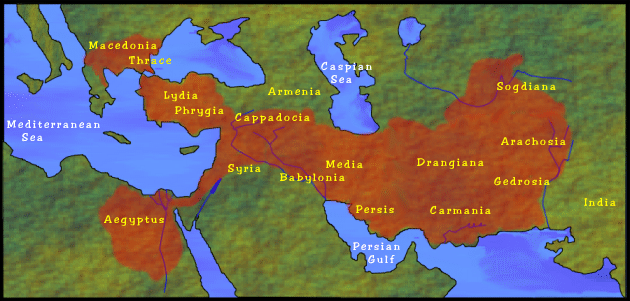
However, all this changed by the end of the fourth century B.C.E. due to an extraordinary event, an event that turned out to be very significant in the history of astrology: the expedition, primarily martial but to some extent cultural as well, of Alexander the Great into Asia and particularly into Mesopotamia, the cradle of astrology.
I should emphasize here that Alexander, being the child of a priestess and the spiritual child of the philosopher Aristotle, was not interested just in conquering nations but also in learning their culture. In point of fact, his army comprised many Greek scientists (geographers, historians, botanists, astronomers, philosophers etc.). His fervent wish was to explore, conquer and then UNITE all the people, all the countries, all the known back then world! Alexander was intelligent enough to know that if he were to succeed in his cause he had to show tolerance towards the religion and culture of each country and allow the free flow of ideas within his immense empire.
So, by the time Alexander’s army entered victoriously into the city of Babylon, astrology (in its non-horoscopic form) had reached full growth in Mesopotamia. The Greeks took an immediate interest in astrology. They somehow became heirs of the vast astrological notions accumulated throughout the centuries between the Mesopotamian great rivers. With their philosophical and inventive minds they revised those notions, they applied mathematical and geometrical principles to them and finally transformed the Mesopotamian astrology into the horoscopic astrology we know today. And it all started with Alexander the Great! Of course, the promotion of astrology was not in his goals when he campaigned against the Persians in the Middle East. However, as far as we know astrology was not contrary to his beliefs.
Alexander was initiated in various mysteries so he probably had some knowledge of astrology. And as he was mostly following the local traditions he must have had astrologers in his court (the Persian kings before him habitually kept royal astrologers in their palaces). Actually, we have some very tangible testimonies on Alexander’s belief in astrology, coming out not just from one but from three different sources (Plutarch, Arrian and Diodorus Siculus). Diodorus is the most descriptive of all:
“When Alexander was about to enter Babylon, the so-called Chaldeans came to meet him. These Chaldeans had gained much fame and glory through astrology, as they could predict - by the means of their centuries-long observation of the stars - the future events! And the Chaldeans predicted the death of the king within the city of Babylon”2.
Now, as all historians recount, Alexander took very seriously into consideration this prediction, as if he really believed in astrology! Thus, I am fairly sure that he kept astrologers in his court, astrologers that very plausibly had cast the “chart” of Alexander, passing on his planetary positions to their successors. The astrological identity of this supreme blonde conqueror that came from the west must have been a matter of prime interest among the Babylonian - Persian astrologers of the time. However, to date no “Alexander’s Irano- Babylonian chart” has been found.
The fake Alexander’s charts! Longing for his true birth date
Not having in our disposition a "first hand" chart of Alexander the Great we must necessarily turn our attention to any available "second hand" ones. Two such alleged Alexander’s charts were published in the 17th century. The first one was cast in 1652 by the Italian Andrea Argolo (the so-called "little Ptolemy"). On it, we can read: "Genitura Alexandri Magni, 12 Augusti 355 Anno Christum, 16:40 P.M.". As soon as I laid my eyes on this chart I sought to verify the planetary positions displayed on it. And when I purchased the means to do so, I noticed that its planetary positions are generally correct (there is only a deviation in the zodiacal positions of the Moon and Mercury). However, this cannot be a genuine chart of Alexander, because we are quite sure by now that he was born in 356 B.C.E. and not in 355 B.C.E.
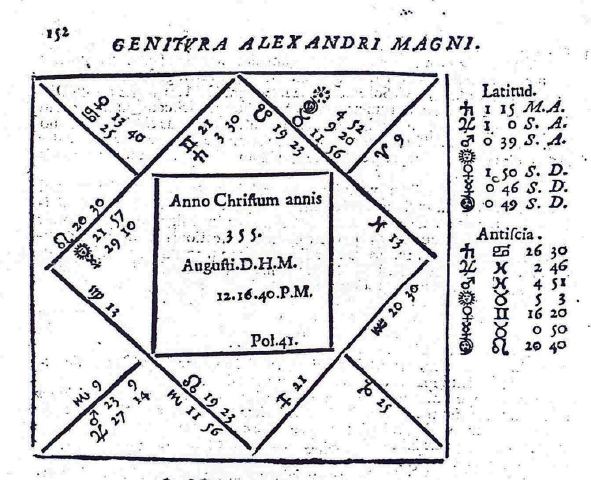
The second alleged Alexander’s chart is a horoscope included in Gadbury's "Collection of divers choice Nativities" published in 1662. On it we can read: "Alexander Magnus, born 357 years ante Christu, July 1, 9h. 26 m. P.M.". I have calculated the planetary positions for this date and I concluded that, although the positions are surprisingly accurate, this chart is a fake one too! Alexander obviously was not born in 357 B.C.E. Given the fact that both these charts are fake we still wonder how did the astrologers of the 17th century manage to calculate with such a precision a nativity so remote in the past!
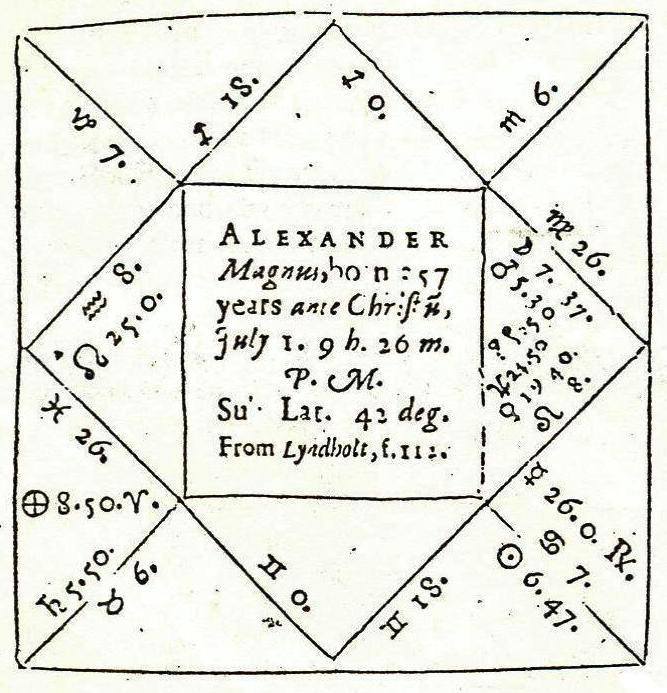
So, unfortunately, there are no authentic historical finds or documents that could shed some light on the astrological identity of Alexander the Great. Thus, our last option would be to find out his calendric date of birth and consequently cast his horoscope based on it. Many ancient historians have written on Alexander but today we have in our hands the works of five of them: those of Plutarch, Arrian, Diodorus Siculus, Quintus Curtius and Justine, all posterior to Alexander. Among these five historians, only Plutarch mentions Alexander's date of birth. He states:
"Alexander was born on the sixth of the month which by the Athenians is called Hecatombaion and by the Macedonians Loos" 3.
This is our major historical reference on Alexander's date of birth. However, this reference does not automatically solve our problem. First of all, Plutarch lived three whole centuries after Alexander. How can we be sure that he knew the true date of birth of Alexander? And then, even if we were sure of the correctness of the date provided by Plutarch we would still have difficulties in converting this Macedonian date (6 of Lóos of 356 B.C.E.) into the corresponding date of our modern calendar! They were simply inserting - every now and then - one or more extra months, in order to keep their calendar in pace with the seasons. These rather arbitrary “intercalary” months constitute today one of our major problems when we try to convert an ancient date into a modern one. And to make things even worse, every Greek city-state followed its own calendar, which usually was not synchronized to the other city-states calendars. Maybe you understand now why the date provided by Plutarch is not immediately providing us a modern date.
To go back to our initial skepticism, how reliable such a date can be? Personally, I believe it is the correct one. Plutarch, as one can deduce from his works, was a very serious and cultivated historian. The dates provided by him are generally accurate! Plutarch was a Greek, so he had easy access to all "first hand" writings preserved at his epoch of the historians and the officers of Alexander the Great. He precisely quotes, for example, dates and events from the very royal “annals” of Alexander, meaning that his sources indeed were “first hand”! Not to mention the wondrous libraries - like the Alexandrian one - he had in his disposition; In addition, we have another ancient source that somehow confirms the date provided by Plutarch. It comes from the Roman writer Claudius Aelianus (Aelian) who lived between the 2nd and the 3rd century C.E. Aelian writes in his "Varia Historia": "...The sixth of the month Thargelion is considered a very lucky date for the Greeks... on that date they won many battles... Alexander the Macedonian, the son of Philip was born on that day too" (4). Actually, Aelian does not specify whether the expression “on the sixth day” implies the 6th of the month Thargelion or generally the 6th day of some - not mentioned here - month. I think he means the latter because we are fairly sure that Alexander was not born in the month Thargelion. Aelian lived after Plutarch but apparently, he did not copy him - in such a case he would also have written that Alexander was born on the sixth of Hecatombaion. So, we have two ancient historians emphasizing the 6th of a certain month as the birthday of Alexander (and this month could be no other than Hekatomabaion - corresponding to the Macedonian month Lóos).
Still, we have to ask ourselves another question: was the date of birth an important date to ancient Greeks? Did the Greeks “party” on their birthday? To answer, it would suffice to quote a line from the philosopher’s Epicurus will (Epicurus was contemporary to Alexander): “…and I leave you the indispensable money so that you can celebrate each year my birthday, on the ninth of the month Gamelion” (5). Many other sources confirm that the ancient Greeks were celebrating their birthday just as we do today! This corroborates my hypothesis that the general public knew Alexander’s birthday, let alone the royal historians who wrote his memoirs. For all these reasons I consider the date provided by Plutarch as a reliable one!
Plutarch does something more than simply mentioning the (Macedonian coined) birthday of Alexander. He additionally informs us that Alexander was born in a Macedonian month (Lóos) that corresponds to the Attic (Athenian) month of Hecatombaion. This is an important piece of information because - as we have a relatively extensive bibliography on the Attic calendar - we know that Hecatombaion corresponds roughly to the annual mid-July mid-August period. We say “roughly” because - due to the aforementioned intercalary month additions - the Macedonian month of Loos could “slip” so much as to correspond to our month of October! On the other hand, we are fairly sure that Lóos could not correspond to a month prior to our July (the Macedonian calendar was soli-lunar, thus “short” in respect to ours, so we have to add a certain amount of days in order to equate a Macedonian date into a contemporaneous one. Taking into consideration all these facts, we determine a relatively narrow time span for Alexander’s birthday. He should have been born between July and October of 356 B.C.E. His Sun should be then in one of the following zodiacal signs: Cancer, Leo, Libra or Scorpio!
The next step is to confirm this time-span and hopefully shorten it. The historian Arrian will help us in this direction. Quoting Aristobulus, one of Alexander's officers and historians, Arrian says that Alexander lived 32 years and 8 months - and these 8 months completed (6). The fact is that we know with sufficient precision Alexander's date of death (which has been preserved apart from the Greek royal annals in various Babylonian, Egyptian etc. documents). According to Plutarch Alexander died on the last day of the Macedonian month Daisios, in 323 B.C.E. (7)Most modern chronologists and historians (

Additionally, there is another historical citation that equates the Macedonian month of Loos to our September / October annual period. It comes from the orator Demosthenes. In one of his books called "On the Crown" he quotes a letter written in 339 B.C.E. by the Macedonian King Philip to the Peloponnesians. In this letter, King Philip is asking the Peloponnesian delegates to meet him sometime "in the month of Lóos, which the Athenians call Boedromion and the Corinthians Panemos" (9). Since Boedromion was the 3rd month of the Athenian calendar (that usually begun at summer solstice), this month would roughly correspond to our September / October annual period. We are given two precious clues here: 1) that the Macedonian month Lóos did not always correspond to the Athenian month of Hecatombaion. 2) That the aforementioned calendar equation is opening us a “wormhole” to the past, as it suddenly brings us so close to Alexander’s birth date! The year 339 B.C.E. is just 17 years away from Alexander’s birth date! And since the Macedonian months were usually slipping ahead - in respect to our modern calendar, as the years were passing - it would be obvious to think that Alexander was most probably born in a period prior to the September / October one! But not too far away though, because in just 17 years not too many “missing days” would have been accumulated so as to “transfer” Alexander’s birth date i.e. in July, let alone in June! So, this evidence contradicts the widespread scenario of Alexander being born in July and consequently him being a Cancer. Nor do the Virgo and Libra scenarios look more plausible to me! In fact, three other pieces of evidence coming from Plutarch, Diodorus Siculus and from an early Byzantine chronicle suggest a late summer birth!
Plutarch states that Philip, Alexander's father, received simultaneously - while conducting a military campaign in northern Greece - three pleasant news items: 1) that one of his generals won a victory, 2) that one of his horses won a race in the Olympic Games, and 3) that Alexander was born (10). We know that the Olympic Games were taking place in the second half of the summer, most probably in August. Some eminent scholars like the British historian George Thomson get more specific, suggesting that the Olympic games were taking place either in August - on the 9th or on the 22nd of the month - or in September - on the 6th of the month, depending on the year” (11). Now, it would normally take a few days for a messenger to bring to Philip - either by ship or by horse - the news of his horse's win. But the news of his horse's win and Alexander's birth reached Philip simultaneously, so Alexander could not have been born in late September, let alone in October!
The late summer birth scenario gains momentum
The second evidence comes from the fact that Alexander became king directly after his father’s assassination, when according to Plutarch he had just completed his twentieth year of life12. Philip was assassinated during a ceremony in an open theater, in the early morning. Diodorus Siculus describes the relevant scene13. From his description, one can understand that the day of Philip's assassination was a rather hot one. It could be a day in late summer or at most in early September. Remember we are in northern Greece, in a city that lies almost at the latitude of New York City. The mornings of late September and October are getting chilly there and are not ideal for a ceremony in an open theater. So, Philip might have been assassinated in late August or in early September. Immediately after, the Macedonian people and the army proclaimed Alexander their new king. According to prominent German chronologist Julius Beloch, Alexander was proclaimed king in September 336 BCE14. So, if he had already completed his twentieth year (as Plutarch states), then he should have been born either in the first days of September or (most probably) in August.
Finally, an important piece of evidence has been preserved in an early Byzantine chronicle known as the “Chronicon Paschale”. As this chronicle testifies, the Macedonian calendar was still in use in the 4th century C.E. in Constantinople! In fact, in one of its pages we read:
“…and in the same year (367 C.E.) Gratianus Augustus was proclaimed emperor in France, in the month of Loos, nine days before the “Calends” of September!”15
But as the Roman Calends correspond to the first day of the month, the Calends of September correspond to the 1st of September. If we now subtract nine days out of this date we come to the 23rd of August (give or take 2 - 3 days maximum to convert this date to its modern one, as the Roman calendar was not that much out of phase back then). So, the “Paschale” chronicle turns to be very valuable because it is the first official source that we ever encountered equating the Macedonian month of Lóos to our modern month of August!
Taking in consideration all the aforementioned evidence and methodically synthesizing it, we could say that the second half of August is the period that better corresponds to the prerequisites we have set forth. This period lies in the middle between the two extreme cases of Alexander’s birth in July (as some historians and astrologers claim) or in September/October (as i.e. Philip’s letter suggests). To turn back to Aristobulus, I think that he himself was misled by the faulty Macedonian calendar, which was full of adjustments (both Philip and Alexander i.e. were changing at will the Macedonian calendar in order to fit their often whimsical plans16) and of intercalary months, and thus he omitted a whole month in stating Alexander's span of life. Instead of saying that on his death his age was exactly 32 years and 8 months completed he should have said 32 years and 9 months completed (meaning that Alexander’s death came as he was about to enter the tenth month after his 32nd birthday).
Another fact that could prove valuable to us here is that the calendar of the ancient Macedonians was a soli-lunar one. Each of their months was usually regulated according to the Moon's phases, thus the first date of every month should ideally coincide with the New Moon or at least with the first appearance of a crescent Moon in the sky. They always kept this in mind, particularly when they were adjusting their calendar (to which they were so fond that they maintained it even after the Romans imposed them the Julian calendar!)
The New Moon of August 356 B.C.E. fell on the 13th. So, under ideal conditions, the 6th of the Macedonian month Lóos of 356 BC should correspond to the 18th of August of that year (6 days ahead of the 13th of August, the first one being the 13th). On the 18th of August 356 BCE (17) the Sun was in Leo and the Moon was transiting through Libra and Scorpio (18)!
No doubt here about the Leo Sun! If one meticulously studies Alexander’s biography he will realize that this extraordinary man exhibited every single trait of this regal, dominating, heroic sign! He even maintained caged lions in his palace, evidence that might seem slim to some but many times the details say much about a man (the Virgo Roman emperor Honorius was keeping in his palace pet poultry, instead)!!
We have drifted so far in the endless corridors of time and by carefully following the signs that the various sources were providing us we finally came close to our destination. We are standing now in the right corridor, but we don’t know which door - out of the several ones around us - we should open! The year is right (356 B.C.E.), the season is right (late summer, as the evidence suggests) and the month seems to be right (August)! But which date of August is the right one? Is it the 18th of that month? It would be, under ideal conditions. But these conditions rarely occurred in the soli-lunar Macedonian calendar! One major clue is that this calendar was mostly “short” in respect to our modern one. So, most probably, we have to add a certain number of days - to the given date 18th of August - in order to get the true Alexander’s birth date.
How many days, then? More or less 11 days, under ideal conditions. But as we explained, these ideal periods were “the exception to the rule”. So, we might be here just a step away from our destination but without further historical or calendric evidence in our disposition, we actually stand in front of a dead end! And the only alternative we are left with is to apply some kind of extrapolation.
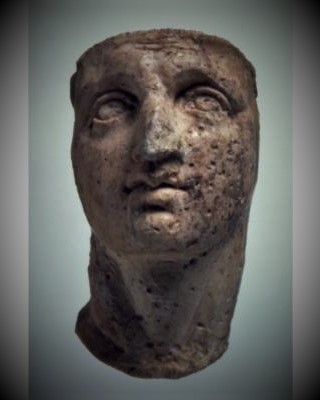
If we persist on the fact that Alexander should be a Leo and not a Virgo, then we are restraining our time span into a frame of just eleven days - from 18 to 28 August 356 B.C.E. - when the Sun was in Leo! But then, his Moon should be in one of the following five signs: Libra, Scorpio, Sagittarius, Capricorn, and Aquarius. Thus, things are getting a lot simpler now! If we pick up the right Moon then we are indirectly determining Alexander’s most probable birth date!
I personally think that we have an easy pick here. Having thoroughly studied Alexander’s life, “knowing” his character, I opted right away for a Sagittarius Moon! Such a Moon is in perfect accordance to Alexander’s exuberant and over-optimistic soul, to his fervid wish to go beyond the horizons, to step onto new continents, to seek the very ends of the world! It also says much about Alexander being well educated and spiritually raised by a philosopher like Aristotle! It explains his profound interest in literature (unusual for a military man), his unshaken belief in God, his mother Olympias that was a priestess and his three wives that were all foreigners. It even explains his legendary affection to his horse, Bucefalo!
Of course, I know that strong Jupiterian - or Ninth House - emphasis might as easily produce similar effects! But just to a lesser extent! Only the pure, archetypal energy of a Moon in the sign of Sagittarius would produce a restless soul like Alexander’s! And if we assume that his Moon is in the sign of Sagittarius then we can determine his very date of birth (give or take 2 days)!
In August 356 B.C.E. the Moon was transiting in the sign of Sagittarius during the following time frame: between the 19:24 hours of the 21st and the 6:31 hours of the 24th day of the month!19 So, theoretically, Alexander should have been born sometime then. Still, a new burning question arises: when exactly? It’s not easy to say, as we are in totally uncharted territory here without any kind of landmarks in our disposition
We are forced thus to draw conclusions out of another enlightening lead, stemming out of Alexander’s character. He possessed an unusually explosive character! His outbursts were proverbial (in one of them he even speared to death his close friend Cletus). But such violent outbursts do not exactly suit a classy Leo having his Moon in the civilized, benevolent sign of Sagittarius. And since the Moon astrologically represents the human soul, there should be some explosive planetary configuration related to his Moon!
Actually, there might be one! On the 24th of August 356 B.C.E. the Moon - in the last degrees of Sagittarius - on the one hand forms a square aspect to natal Jupiter and on the other approaches the already highly charged axis of the Mars - Uranus opposition, thus forming an unusually explosive T-Square configuration! Normally, such an electrified Moon would produce some particularly violent reactions to a man, especially when women figures are involved in (trying i.e. to restrain him - and definitely Olympias, his manipulative mother, was top of the list here. Alexander loved her alright but often had a hell of a row with her, so he deliberately kept her away of him). To conclude, neither on the 21st nor on the 22nd or the 23rd of August 356 B.C.E. any other equally explosive lunar configuration is formed!
But if his date of birth is the 24th of August and his Moon is in Sagittarius then we have indirectly established a time span for his birth time, as well: he should have been born between 00:00 and 07:00 hours19. In reality, we have no direct testimony on Alexander's time of birth. Pseudo - Kallisthenes who wrote a somewhat romantic biography of Alexander in the 3rd century AD claims that he was born at sunrise and that he died at sunset.
Furthermore, a Byzantine astrologer (George Kamateros) is claiming ([Μόνο οι διαχειριστές επιτρέπεται να δουν αυτόν το σύνδεσμο.]) that Leo was the Ascendant in Alexander’s horoscope. Actually, a Leo Ascendant would fit him much more than a Gemini or a Cancer one. In addition, we would prefer his Sun to be close to his Ascendant, in his First House, and this could happen only if he were born around 05:00 - 05:30 A.M. In such a case he would have the Sun, Mercury, Venus and Neptune placed in his First House (a quite rare delineation that could explain the extraordinary charisma of this young man, the magnetism that he was radiating around him and that made his soldiers follow him to the ends of the then known world as if they were being hypnotized). His natal Saturn in Taurus would be in his Tenth House, close to his MC, while the ruler of his Tenth House would be in his First House. These planetary positions fully agree both with the fact that at very young age Alexander accepted responsibility and with the fact of his enormous and everlasting fame.
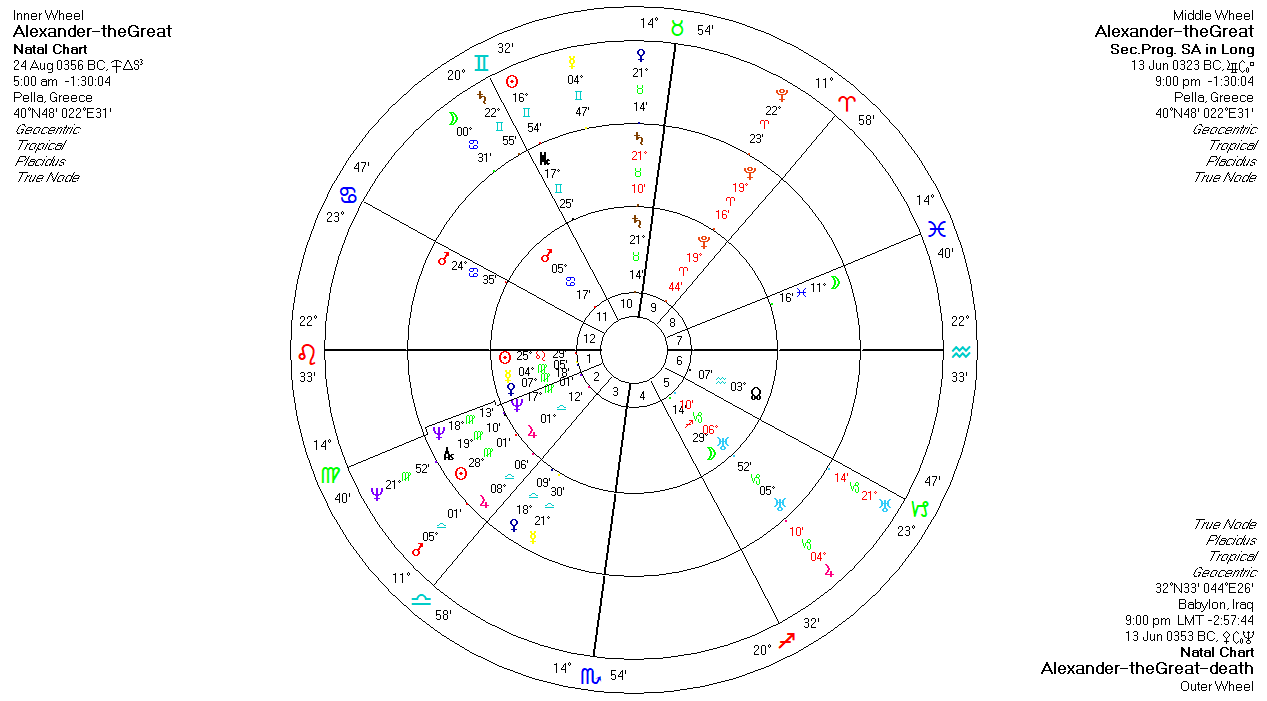
We finally arrived at our destination! By meticulously studying evidence upon evidence, by inductively excluding or including possibilities we determined a date that seems to be the most plausible Alexander’s the Great birth date: the 24th of August 356 B.C.E. The Sun was then in Leo (forming a conjunction to Mercury). The Moon was in the last degrees of Sagittarius. Mercury and Venus (in Virgo) were forming a conjunction as well and are supported by a Mars Sextile and a Uranus Trine aspect. Mars was in Cancer, in square to Jupiter in Libra and in a tight opposition to both Uranus in Capricorn and to the Moon in Sagittarius (as we have already seen)! Saturn was in Taurus in square to his Sun (the difficult relationship he had with his father?).
Rectifying the chart
This hypothetical chart of Alexander the Great corresponds satisfactorily - as we will see - to the known traits of his character. His First House emphasis, for example, depicts very well his impulsiveness, his bellicose spirit and his wish to be the first of the first in every situation. Then, his Venus in Virgo responds well to his legendary sobriety in matters regarding food and sensual pleasures. But the final test would consist in verifying this chart by applying critical Transits and Secondary Progressions to it, for certain major events in Alexander's life.
Let's start with a particularly significant event: his death. The most plausible date of his death is the 11th of June 323 B.C.E. (some scholars opt for the 10th). The planetary Transits for this date are highly significant: transiting Pluto and Uranus - which are partile conjunct at 21 degrees of Taurus - form a square aspect to Alexander's hypothetical natal Sun, at 25 degrees of Leo! Transiting Neptune at 28 degrees of Scorpio also forms a square aspect to his natal Sun (an aspect that becomes even more significant if we consider Neptune as the ruler of Alexander's Eighth house).

Transiting Saturn at 29 degrees of Gemini forms a partile opposition to his natal Moon, a conjunction to his natal Mars and a square to his natal Jupiter. Transiting Jupiter at 150 of Cancer forms a square aspect to his natal Pluto. Transiting Mars in his natal First House forms a conjunction to his Venus (the ruler of his natal Tenth House) and to his Neptune. Transiting Venus forms a square aspect to his Nodal Axis. Transiting Mercury forms a conjunction to his Mars and a partile opposition to his Uranus. Transiting Sun - at 16 degrees of Gemini on that fatal day - squares Alexander's natal Neptune (just one among many aspects that allude to a probable poisoning). Finally, the transiting Moon is forming a square aspect to his natal Pluto (while it is about to get in his Twelfth House). The response of this chart to the Transits set for the date of Alexander’s death is very impressive!
But equally significant are the Progressions set for that inauspicious date: his progressed Moon is forming an opposition to his natal Neptune (ruler of his Eighth House. Plus, his Progressed Moon would be just entering then in his 8th natal House, if Alexander were born a little earlier). His progressed Sun forms a square aspect to his natal Moon (ruler of his Twelfth House). His progressed Mercury and Venus form an opposition to his natal Pluto and his progressed Mars forms a square to his natal Pluto! Finally, his progressed MC is squaring his natal Neptune (the ruler of his 8th House)!
Another important event that we should test here is the assassination of Alexander's father Philip, around September 10th, 336 B.C.E.
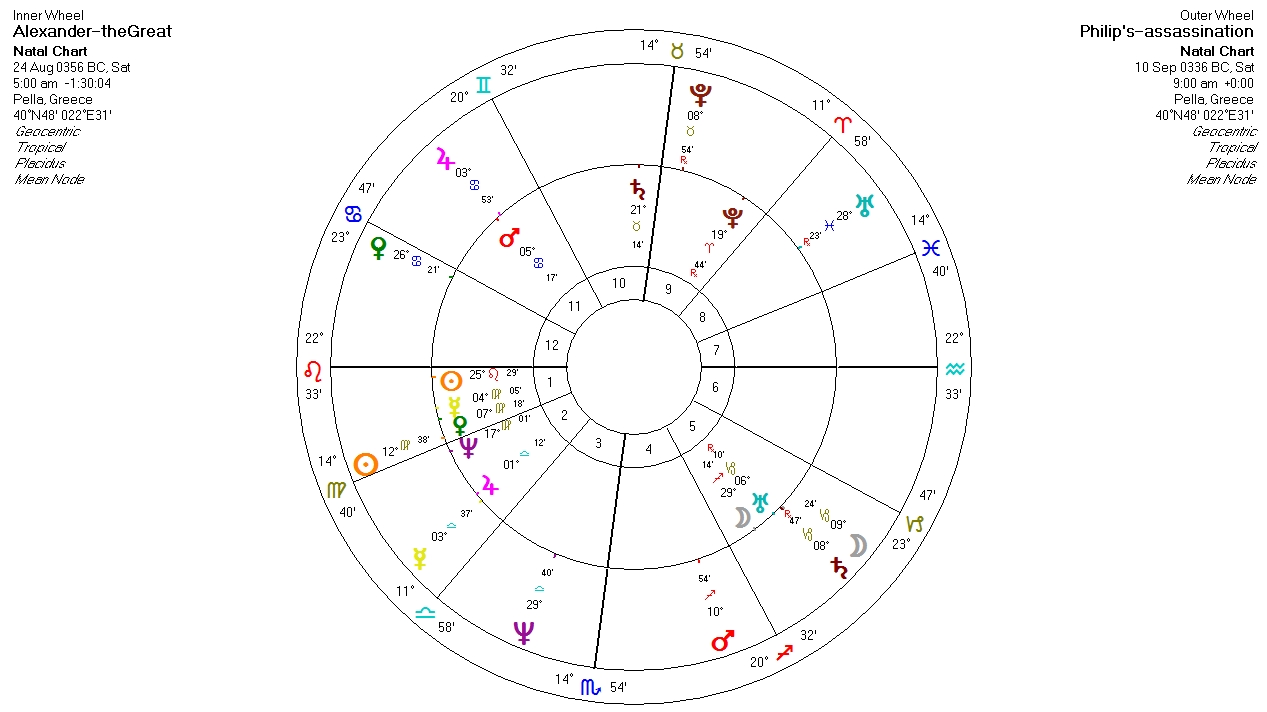
Uranus was transiting then in the Alexander's natal Eighth House, forming a perfect square to his natal Moon (a sudden and rather odd death that was to change his family status?). His natal Mars was conjoined by transiting Jupiter and opposed by transiting Saturn. This bipolar influence of Jupiter and Saturn on his natal Mars indicates both the responsibilities that suddenly fell on Alexander’s shoulders right after his father’s death and his burning desire to become a leader, to take initiatives, to act.
Curiously enough, a similar bipolar configuration results from the Progressions set for that grim event:
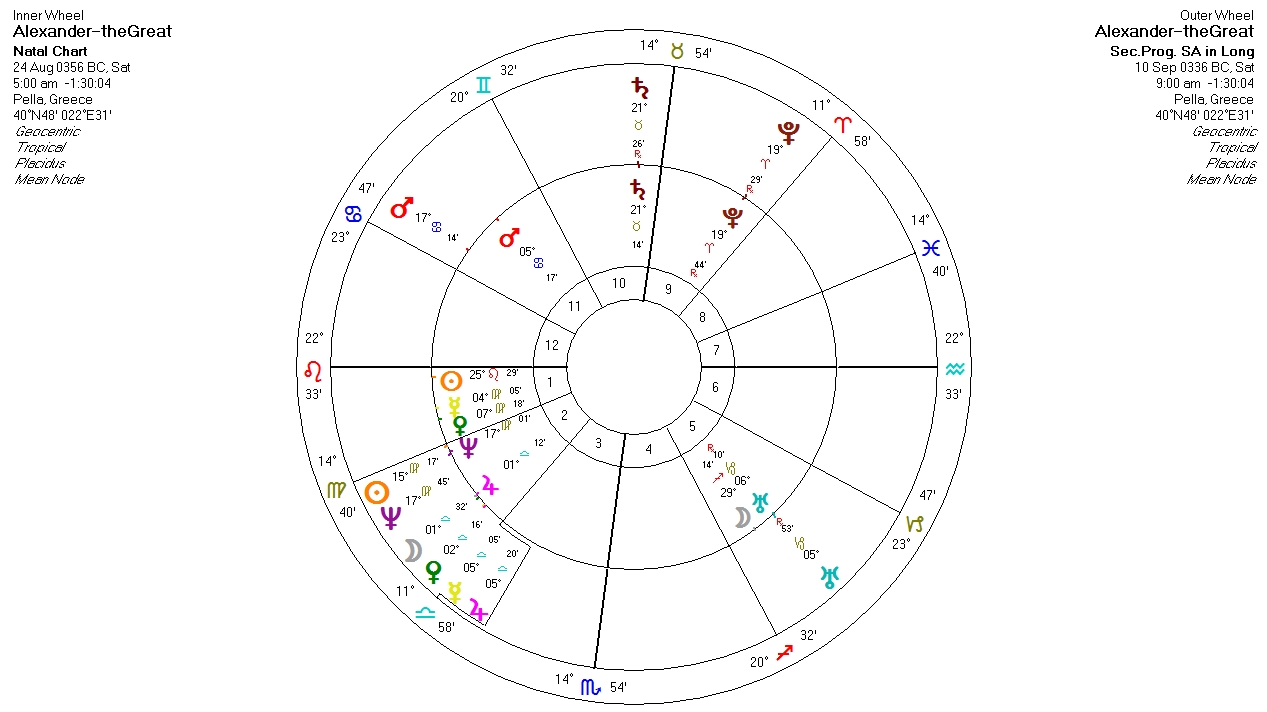
Alexander’s progressed Sun conjuncts his natal Neptune (ruler of his natal Eighth House). And then, his progressed Moon partile conjuncts his natal Jupiter! This aspect literally takes us out of surprise! How comes such a joyful configuration occurs in such an ominous day? We could never understand it unless we first thoroughly study the life of Alexander.
You see, he had a terrible relation to his allegedly tyrannical and drunkard father! He was not even considering Philip to be his father (his mother had confessed to him that he was not)! In addition, Philip had in those days had just married another (very young) woman, whose offspring would someday claim the Macedonian throne, at Alexander’s expense! All these facts had utterly embittered Alexander and his mother Olympias. No wonder then that mother and son somehow rejoiced and felt free on Philip's assassination! And even more so because on that very day Alexander was proclaimed the new king of Macedonia!
Of course, it is not a good thing to rejoice on your father’s (or husband’s) death, but it is all human and it happens sometimes (probably more often than you think)! And in the end, this is the magic of astrology! It enables us to get into distant peoples private lives, into the very souls of people that perished so many centuries ago!
To move onto another event now, let’s test the notorious Kydnos river occurrence, where Alexander fell sick for many days. On a hot summer day of 333 B.C.E. (probably mid-August) and while he was in the middle of his campaign to Persia, Alexander took a refreshing bath in the frozen waters of the ominous river Kydnos (in Asia Minor - contemporary Turkey). Soon after this bath he got sick and was forced to stay in bed for several days. Transiting Saturn (in his Sixth House) was forming then an opposition to his natal Sun and a square aspect to its natal position. At the same time, both Sun and Mars were probably transiting in his natal Twelfth House.
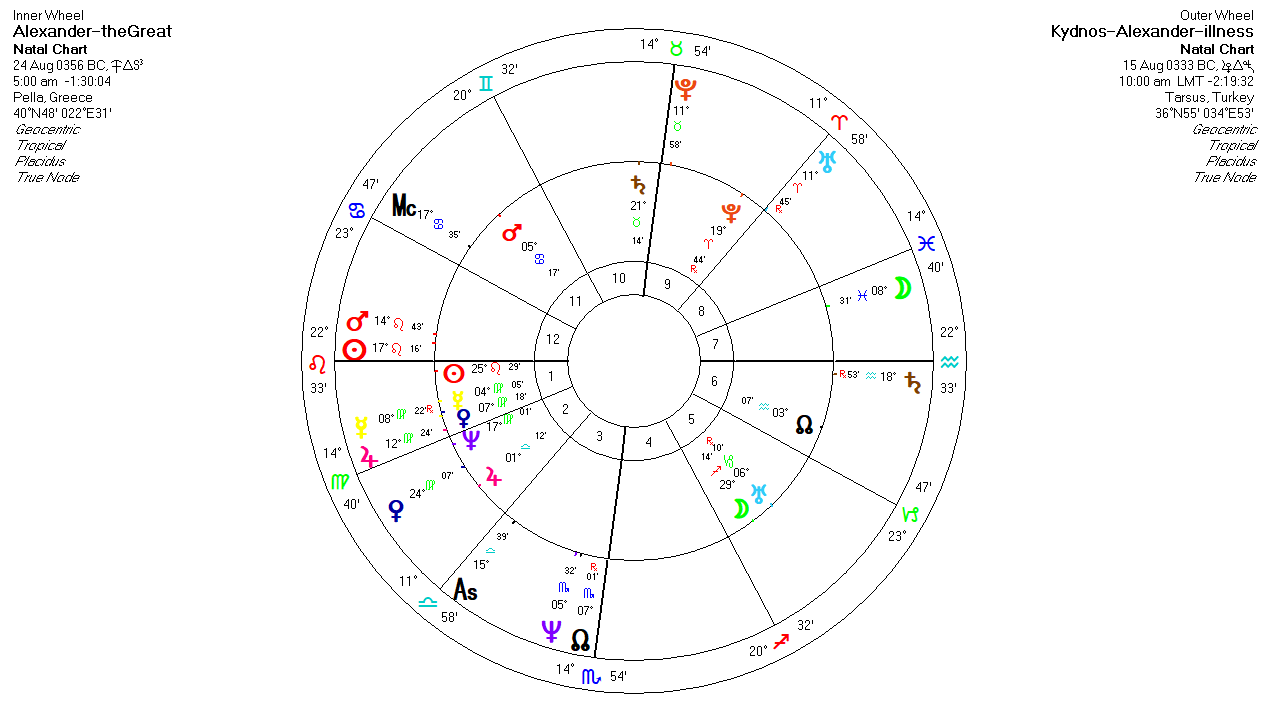
By the beginning of 325 B.C.E., Alexander had reached the most remote part of his expedition (India), but he wanted to go even further (transiting Jupiter was in his natal Ninth House). His soldiers refused to follow him. In January of that year - during a bloody battle against the people of Malion (or Malon, a region corresponding probably to modern day Massaga, in northern-east Pakistan) - Alexander behaved very imprudently and was seriously wounded in his chest by an arrow. He barely escaped death and remained on a stretcher for several weeks.
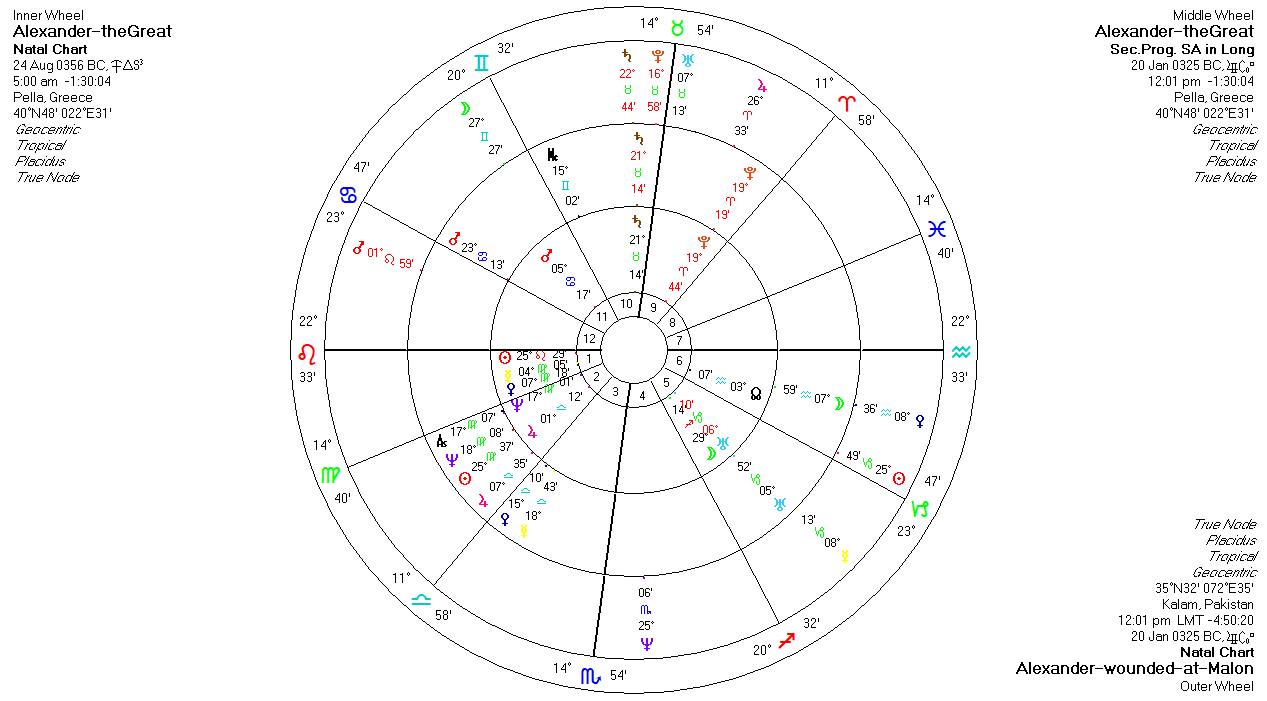
Transiting Neptune (ruler of his Eighth House) was then at 25 degrees of Scorpio, forming a perfect square to his natal Sun while transiting Saturn at 23 degrees of Taurus was also forming a square to his natal Sun (and a conjunction to his natal position)! Transiting Pluto is hovering over his Midheaven (in fact, a rumor that Alexander died had spread among his soldiers on this particular period). His progressed Moon and Venus are in his Sixth House, while his progressed Ascendant was forming a partile conjunction with his Neptune! Additionally, Mars was transiting in his natal Twelfth House and most likely the Sun was transiting in his Sixth House!
As the last event to rectify here we shall take the legendary collective marriages celebrated at Susha (Shush) in Persia between (approx.) ten thousand Greek soldiers and that many Asian women (Alexander himself got married on that occasion, for the third time)! These marriages were actually Alexander's idea and took place around the first days of April 324 B.C.E.
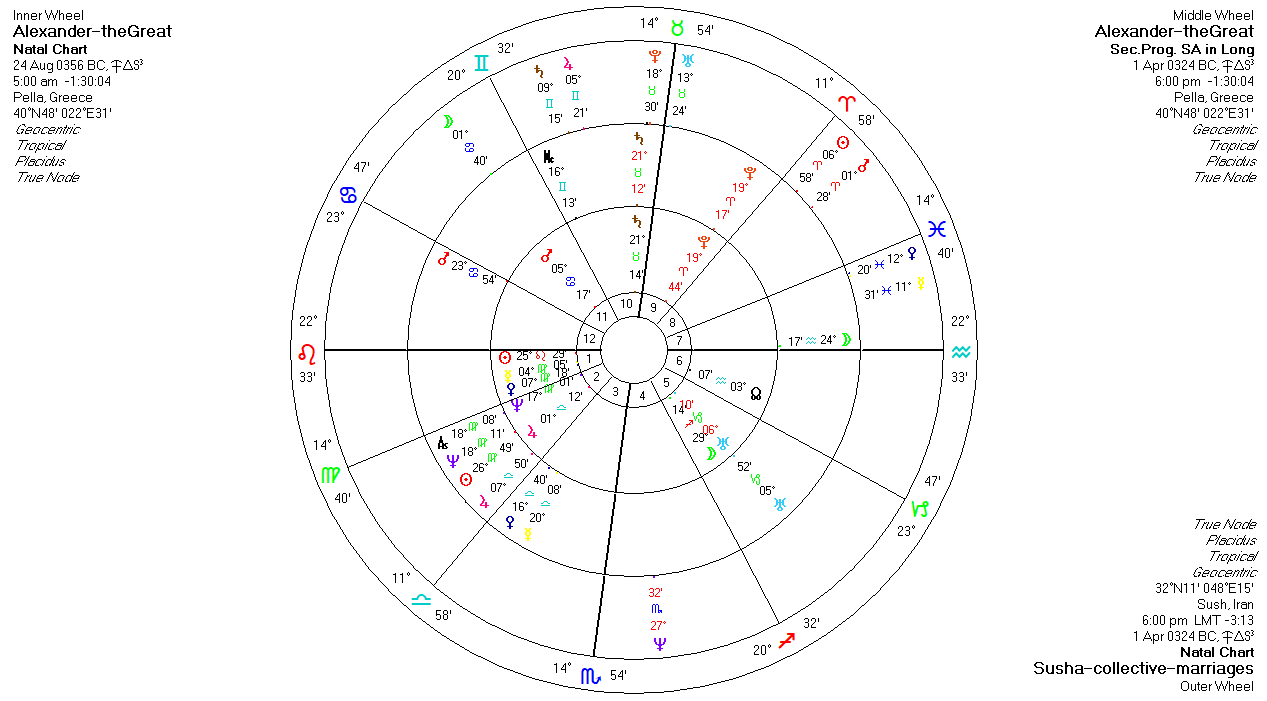
By applying Secondary Progressions we see that the Alexander’s progressed Moon had just entered then in his Seventh House (forming an opposition to his Sun)! According to Dane Rudhyar, a major consciousness shift occurs within the individual when his progressed Luminaries (Sun - Moon) cross the border of the personal versus the collective semi-cycle of the horoscope (the cusp of the Seventh House functions as a major threshold, since it marks the very area where the semi-cycle of the subjective consciousness ends and the one of the collective consciousness starts over)! How effectively then the aforementioned progressed Moon depicts Alexander's inner state of mind in that Spring of 324 BCE! From his prominently individualistic anterior consciousness, he was just passing then into a brand new collective kind of consciousness and this interior metamorphosis of his was externally manifested both by his own marriage and by the unusual collective marriages he then celebrated at Susha...
Among his Transits, we should note Mercury in his Seventh House and Venus in his Eighth House, in opposition to his natal Neptune. Additionally, transiting Jupiter and Saturn (being in conjunction) form a square aspect to his natal Venus. This last aspect might also be considered as producing a major shift in Alexander's way of seeing his relation to the others. Finally, transiting Uranus ruler of his natal Seventh House conjuncts his MC! This particular astrological configuration depicts remarkably well those unusual collective marriages of convenience, as they were. It was upon the descendants of these 10.000 Greek - Asian couples that Alexander was planning to structure the future shape of his empire, an empire that he dreamt of as global, homogeneous, highly civilized, prosperous and everlasting!
Thomas D. Gazis
Copyright: Thomas D. Gazis
NOTES
[size=90]1. We have to clarify something here: A recently founded (former Yugoslavian) state has been self - baptized "Macedonia". This newly hatched state (whose inhabitants are mainly of Slavonic and Bulgarian or Albanian descent) has nothing to do with ancient Macedonia, a geographical area in northern Greece inhabited by the Macedonians, a people whose culture, religion, language was (and still is) Greek. In reality, those self-proclaimed "Macedonians" descended to the Balkans around the 6th century CE, so they are almost a 1000 years shy of Alexander's era!
2. Diodorus Siculus, “Historical Library”, book XVII, 112.1
3. Plutarch : Alexander, III-5.
4. Claudius Aelianus : Varia Historia,B,25,28-34.
5. Epicurus, The Will, 18
6. Arrian : History of Alexander, VII-28.
7. Plutarch: Alexander, LXXV, 6
8. Beloch, Samuel, Hamilton etc.
9. Demosthenes: De Corona,157.
10. Plutarch: Alexander, III-8.
11. George Thomson “Ancient Greek Society” ,V,5.
12. Plutarch : Alexander, XI-1.
13. Diodorus Siculus, XVI, 92-2.
14.Julius Beloch, “Griechische Geschichte“, III,2, 59-60.
15. Apostolos Karpozilos “Byzantinoi Istorikoi kai Chronografoi”, (Kanaki), A, p.525 .
16. Both Philip and Alexander were arbitrary adding days in the Macedonian calendar so that it
would fit their plans, their soothsayers' predictions etc.
17. All mentioned dates are “Old Style”.
18. All astronomical and astrological calculations effectuated by the “Solar Fire
Deluxe” program.
19. Hours are expressed in E.E.T.
----------------------------------------------------------------------------------------------------------
This is an original article, written by Thomas Gazis. Copyright: Thomas D. Gazis. If you wish to re-publish parts or all of it please contact the author at: [Μόνο οι διαχειριστές επιτρέπεται να δουν αυτόν το σύνδεσμο.]
[Μόνο οι διαχειριστές επιτρέπεται να δουν αυτόν το σύνδεσμο.][/size]



